A difficulty may be raised as to whether every motion is commensurable with every other or not. Now if they are all commensurable and if two things to have the same velocity must accomplish an equal motion in an equal time, then we may have a circumference equal to a straight line, or, of course, the one may be greater or less than the other. Further, if one thing alters and another accomplishes a locomotion in an equal time, we may have an alteration and a locomotion equal to one another: thus an affection will be equal to a length, which is impossible. But is it not only when an equal motion is accomplished by two things in an equal time that the velocities of the two are equal? Now an affection cannot be equal to a length. Therefore there cannot be an alteration equal to or less than a locomotion: and consequently it is not the case that every motion is commensurable with every other.
But how will our conclusion work out in the case of the circle and the straight line? It would be absurd to suppose that the motion of one in a circle and of another in a straight line cannot be similar, but that the one must inevitably move more quickly or more slowly than the other, just as if the course of one were downhill and of the other uphill. Moreover it does not as a matter of fact make any difference to the argument to say that the one motion must inevitably be quicker or slower than the other: for then the circumference can be greater or less than the straight line; and if so it is possible for the two to be equal. For if in the time A the quicker (B) passes over the distance B' and the slower (G) passes over the distance G', B' will be greater than G': for this is what we took 'quicker' to mean: and so quicker motion also implies that one thing traverses an equal distance in less time than another: consequently there will be a part of A in which B will pass over a part of the circle equal to G', while G will occupy the whole of A in passing over G'. None the less, if the two motions are commensurable, we are confronted with the consequence stated above, viz. that there may be a straight line equal to a circle. But these are not commensurable: and so the corresponding motions are not commensurable either.
But may we say that things are always commensurable if the same terms are applied to them without equivocation? e.g. a pen, a wine, and the highest note in a scale are not commensurable: we cannot say whether any one of them is sharper than any other: and why is this? they are incommensurable because it is only equivocally that the same term 'sharp' is applied to them: whereas the highest note in a scale is commensurable with the leading-note, because the term 'sharp' has the same meaning as applied to both. Can it be, then, that the term 'quick' has not the same meaning as applied to straight motion and to circular motion respectively? If so, far less will it have the same meaning as applied to alteration and to locomotion.
Or shall we in the first place deny that things are always commensurable if the same terms are applied to them without equivocation? For the term 'much' has the same meaning whether applied to water or to air, yet water and air are not commensurable in respect of it: or, if this illustration is not considered satisfactory, 'double' at any rate would seem to have the same meaning as applied to each (denoting in each case the proportion of two to one), yet water and air are not commensurable in respect of it. But here again may we not take up the same position and say that the term 'much' is equivocal? In fact there are some terms of which even the definitions are equivocal; e.g. if 'much' were defined as 'so much and more','so much' would mean something different in different cases:
'equal' is similarly equivocal; and 'one' again is perhaps inevitably an equivocal term; and if 'one' is equivocal, so is 'two'. Otherwise why is it that some things are commensurable while others are not, if the nature of the attribute in the two cases is really one and the same?
Can it be that the incommensurability of two things in respect of any attribute is due to a difference in that which is primarily capable of carrying the attribute? Thus horse and dog are so commensurable that we may say which is the whiter, since that which primarily contains the whiteness is the same in both, viz. the surface: and similarly they are commensurable in respect of size.
But water and speech are not commensurable in respect of clearness, since that which primarily contains the attribute is different in the two cases. It would seem, however that we must reject this solution, since clearly we could thus make all equivocal attributes univocal and say merely that that contains each of them is different in different cases: thus 'equality', 'sweetness', and 'whiteness' will severally always be the same, though that which contains them is different in different cases. Moreover, it is not any casual thing that is capable of carrying any attribute: each single attribute can be carried primarily only by one single thing.
Must we then say that, if two things are to be commensurable in respect of any attribute, not only must the attribute in question be applicable to both without equivocation, but there must also be no specific differences either in the attribute itself or in that which contains the attribute-that these, I mean, must not be divisible in the way in which colour is divided into kinds? Thus in this respect one thing will not be commensurable with another, i.e. we cannot say that one is more coloured than the other where only colour in general and not any particular colour is meant; but they are commensurable in respect of whiteness.













